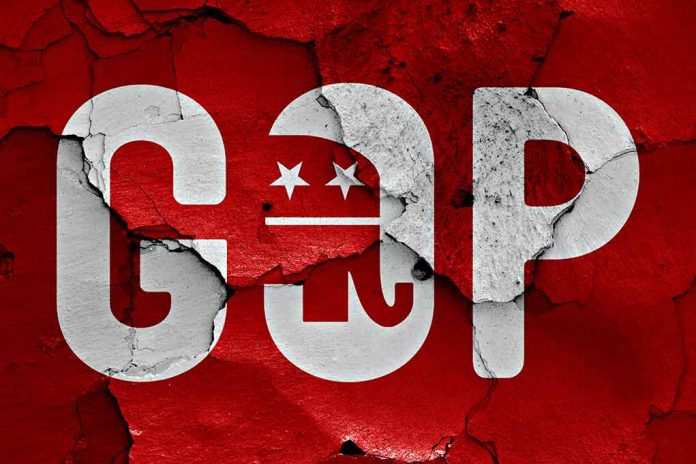
Vice President JD Vance fires back at critics after an article questioned his foreign policy stance on striking Houthi militants in Yemen, exposing tensions within the Republican Party over America’s military interventions abroad.
Top Takeaways
- Vice President Vance labeled Jewish Insider an “anti-JD rag” after it published criticism from anonymous GOP senators regarding his reluctance to support strikes on Houthi militants.
- Vance identified factual errors in the article, including incorrectly attributing U.S. service members’ deaths to the Houthis, which led to a correction from the publication.
- Senator Thom Tillis acknowledged Vance’s consistent position against U.S. military intervention unless there’s a direct threat to American interests.
- Donald Trump Jr. defended Vance by dismissing the anonymous critics as “cowardly neocons,” highlighting the internal GOP divide on foreign policy.
- The controversy stemmed from Vance’s private Signal chat comments that were inadvertently shared with The Atlantic’s editor-in-chief.
The Jewish Insider Article and Vance’s Strong Response
The controversy erupted after Jewish Insider published an article detailing Vice President JD Vance’s reluctance to support military strikes against Houthi rebels in Yemen. The publication cited anonymous Republican senators who expressed concern over Vance’s non-interventionist foreign policy stance. The article portrayed Vance as isolated within his own party and potentially undermining relationships with European allies by questioning whether military action against the Houthis primarily served European rather than American interests.
Vance responded forcefully on social media, calling Jewish Insider an “anti-JD rag” and its editor-in-chief Josh Kraushaar the “biggest hack in Washington.” He specifically pointed to a significant factual error in the article that incorrectly attributed U.S. service members’ deaths to Houthi militants. Following Vance’s criticism, Jewish Insider issued a correction, though the damage to the publication’s credibility in Vance’s eyes was already done.
This morning, @JoshKraushaar ran a hit piece against me in Jewish Insider, which has become an anti-JD rag. It has many problems, including seven anonymous quotes from cowardly Republicans.
But the most glaring factual error is the below, which says the Houthis killed three… pic.twitter.com/kzbzrqjIYC
— JD Vance (@JDVance) March 27, 2025
The Origins of the Dispute
The source of the controversy was a private Signal chat involving Trump administration officials discussing potential military strikes against Houthi rebels in Yemen. These discussions were inadvertently shared with Jeffrey Goldberg, editor-in-chief of The Atlantic. In these conversations, Vance reportedly questioned the strategic value of conducting strikes against the Houthis, suggesting that such actions primarily benefited European interests rather than American ones.
This position aligns with Vance’s consistently articulated America First foreign policy approach, which prioritizes direct American interests when considering military intervention. However, the article portrayed this stance as potentially problematic for the broader Republican foreign policy agenda and suggested it might even disappoint President Trump himself, according to one anonymous senator.
GOP Reactions and the Broader Foreign Policy Debate
While most criticism came from unnamed sources, Senator Thom Tillis went on record acknowledging Vance’s consistent position against projecting American military power unless there’s a direct threat to the United States. Though Tillis noted his disagreement with Vance’s approach, he respected the Vice President’s principled stance. Other anonymous senators expressed concerns that Vance’s views might confuse European allies and potentially shift the GOP’s traditional foreign policy positioning.
Donald Trump Jr. came to Vance’s defense, dismissing the anonymous critics as “cowardly neocons.” This response highlights the ongoing tension within the Republican Party between traditional interventionist foreign policy advocates and the America First faction that has gained prominence during President Trump’s administrations. Some senators viewed the debate as healthy for refining the party’s foreign policy direction, while others worried about its implications for national security priorities.
Journalistic Standards Under Scrutiny
Vance’s criticism extended beyond the content of the article to question the journalistic standards of Jewish Insider and its editor. He called Kraushaar the “dumbest journalist in Washington” for allowing factual errors to be published, particularly the misidentification of which terrorist group was responsible for American casualties. This aspect of the controversy raises questions about media accuracy in reporting on complex foreign policy matters and the responsibility of publications to verify facts before publication.
The episode illustrates the challenges facing the Republican Party as it navigates internal divisions on America’s role in the world. Vance’s non-interventionist stance represents a significant shift from traditional GOP foreign policy that has dominated for decades, creating friction with establishment figures who maintain a more globally engaged approach to national security. As the Trump administration continues, these tensions may define the evolving Republican perspective on international affairs.






















